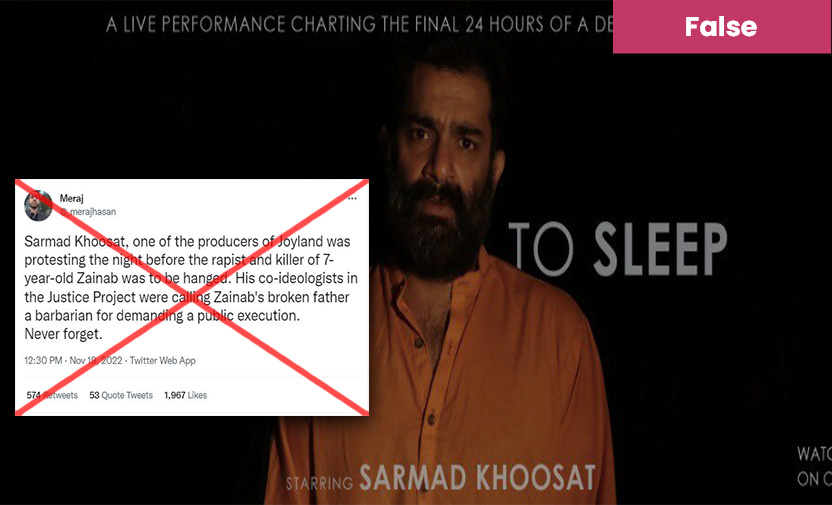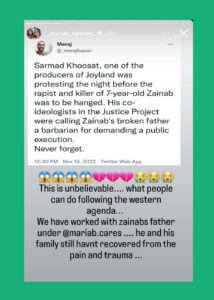
Claim: Sarmad Khoosat protested against the hanging of Zainab Ansari’s murderer the night before his execution.
Fact: Khoosat did not protest against Zainab’s murderer’s execution. He performed an act titled ‘No Time to Sleep’ on 10 October 2018 for World Day against the Death Penalty. The day was first organized by the World Coalition Against the Death Penalty in 2003. It is held annually on 10th October as a civil awareness day to advocate for the abolition of the death penalty.
Zainab Amin Ansari was a 6-year-old girl who was raped and murdered in January 2018. Her body was recovered from a trash heap in Kasur a week after she went missing. The news sparked outrage and protests across the country. #JusticeforZainab became a rallying cry for authorities to take action against Zainab’s killer and the broader issue of violence against children. The response ultimately led to Pakistan’s first child safety law, the Zainab Alert, Response and Recovery Act (ZARRA).
Khoosat is a screenwriter, actor, director and producer known for his bold and critically acclaimed art, depicting topics that many deem controversial. In 2015, he played the character of Sadat Hassan Manto, a controversial writer and poet, in his film Manto. His 2019 film, Zindagi Tamasha, was barred from being released due to controversy about the religiopolitical nature of its plot. He is also the producer of Joyland (2022), which has been lauded as a success by some but sparked major backlash from others due to its central themes and the inclusion of a transgender character. The film also won the Queer Palm at the Cannes Film Festival. #BanJoyland was a trend on social media, and the film was temporarily banned from being released by the Ministry of Information and Broadcasting. The ban was later lifted by the federal government, albeit with minor cuts in the film. The film remains banned from being released in Punjab by the Punjab Censor Board.
On 19 November 2022, Meraj Hasan tweeted, “Sarmad Khoosat, one of the producers of Joyland was protesting the night before the rapist and killer of 7-year-old Zainab was to be hanged. His co-ideologists in the Justice Project were calling Zainab’s broken father a barbarian for demanding a public execution. Never forget.”
https://twitter.com/_merajhasan/status/1593869268411731969
Pakistani designer Maria B, who advocated for the ban on Joyland, also shared a screenshot of the Tweet to her significant Instagram following. She included a caption that reads, “This is unbelievable.. What people can do following the Western agenda. We have worked with Zainab’s father under @mariabcares.. He and his family still haven’t recovered from the pain and trauma.”

Pakistani Designer Maria B shared Meraj Hassan’s tweet on her Instagram story
Fact or Fiction?
Sarmad Khoosat partnered with the Justice Project Pakistan for a 24-hour performance act on 10 October 2018 for World Day Against the Death Penalty. The show aimed to shed light on what an inmate on death row goes through the day leading up to the penalty. Khoosat plays a character called Prisoner Z, based on Zulfiqar Ali Khan. Khan was charged with murder, which he says he committed in self-defence, after receiving an unfair trial. He spent his time in prison earning two master’s degrees, 33 diplomas and taught hundreds of prisoners to read and write. Khoosat’s act permitted 24 batches of 20 people at a time and was telecast live on multiple channels and locally on Dawn. It aimed to humanize prisoners and shed light on Pakistan’s faulty judicial system.
Khoosat explained to Instep magazine, “Life imprisonment is understandable but how do you bring back someone who has been given an unfair verdict? There have been instances where the reversal of a death sentence has been issued but delivered a month or two after the death sentence has already been carried out.”
The JPP website states, “At the time of Pakistan’s independence in 1947, only two crimes, murder and treason were punishable by death. Today, there are 33 crimes that merit the death penalty. Majority of these offences fail to meet the “most serious crimes’ threshold thereby violating Pakistan’s international obligations under the International Covenant of Civil and Political Rights (ICCPR), which Pakistan ratified in 2010.
In December 2014, Pakistan lifted a seven-year moratorium on the death penalty. Coming in the wake of the tragic terrorist attacks on the Army Public School in Peshawar, the resumption of executions initially applied only to individuals convicted of terrorist offences. Yet, in March 2015, and without public justification, the government lifted the moratorium for all death-eligible crimes. As a result, an estimated 6-8,000 individuals were at risk of execution.
Thereafter, Pakistan quickly went from a non-executing state to the third most prolific executioner in the world. Pakistan’s use of the death penalty is among the harshest in the world, accounting for 26% of the world’s death row population, 13% of global executions, and 14% of worldwide death sentences. The application of the death penalty in Pakistan is replete with routine miscarriages of justice resulting in wrongful convictions and botched executions. Despite sporadic efforts at reform, the system remains incapable of reliably administering the irreversible sanction of death. Pakistan’s criminal justice system fails to uphold key procedural and substantive safeguards.”
Understanding JPP’s mission allows one to contextualise the purpose of Khoosat’s performance. Coincidentally, the act took place close to the time that Zainab’s murderer was sentenced to the death penalty. The date for the execution was set to be 17 October. A day before the execution, Zainab’s father, Amin Ansari, appealed to the Lahore High Court to allow for a public execution of the murder. The LHC responded saying only the government had the authority to order a public execution.
It is incorrect to state that Khoosat was “protesting against the night before the rapist and killer was to be hanged”. He had been preparing for the performance for over six months, before the decision to hang the Kasur rapist had been made. His performance took place not on the eve of the execution- 17 October- but on 10 October, a week prior.
Soch Fact Check was not able to find any publicly available comments made by Khoosat about the murderer’s hanging. We reached out to Khoosat for a clarification about whether there was any relation between the performance and the Zainab case, with a screenshot of Meraj Hassan’s tweet. He responded saying, “This is a completely misinformed/wrong fact. There was absolutely no connection. This is a massive distortion and conflation, a stretch of their imagination and (lack of) understanding of the performance- No Time to Sleep. There were no comments on the case.”
In the thread posted by Hassan, he linked another tweet from 2018 with a screenshot of a JPP worker’s tweet as proof of Khoosat’s co-ideologists calling Zainab’s father a barbarian. The JPP worker, Rimmel Mohydin, linked the article above about the Lahore High Court’s dismissal of a public execution with the caption, “LHC dismisses appeal for public hanging. We are not Saudi Arabia. We are not so regressive. We are not barbarians. This would have been an utter dishonour to the memory of Zainab Amin.” While some interpreted this as her referring to Zainab’s father as a regressive barbarian, others pointed out that this she is referring to the act of public hangings, not Zainab’s father.
A twitter user commented, “Why are you misleading – it says “we are not so regressive/barbarian” Don’t stretch it to say she called the father that,” to which Hassan replied, “Because the plea was made by the father.”
Virality
Meraj Hassan’s tweet gained 1,966 likes, 574 retweets and 53 quote tweets. Maria B, who has a following of 384,000 users on Instagram shared it on her Instagram story. The claim was also shared in this tweet.
Conclusion: Sarmad Khoosat did not protest against Zainab Amin’s rapist and murderer’s execution. He staged an act for World Day Against the Death Penalty, a project of Justice Project Pakistan, which aims to raise awareness about the shortcomings of Pakistan’s justice system and the harsh use of the death penalty in Pakistan.
